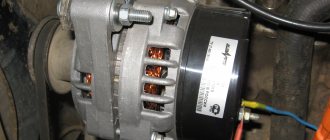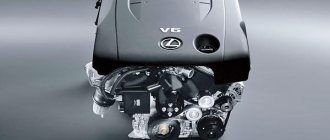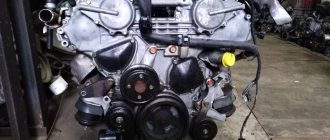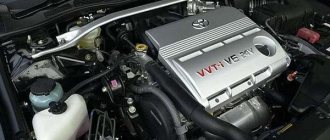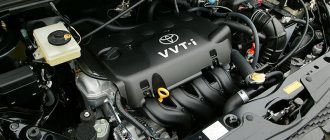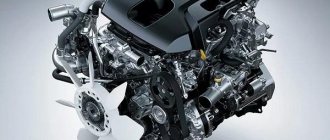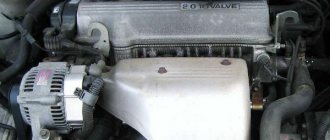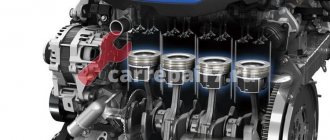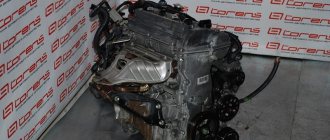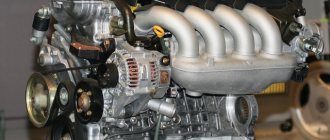The 3UZ FE engine was designed, first of all, to significantly increase the power along with the torque of the power drive of executive class cars. For a heavy 8-cylinder 32-valve design with two timing camshafts according to the DOHC scheme, an aluminum block was used to somehow reduce the load on the car body.
ICE 3UZ FE
The second task of the manufacturer was to adapt to the automatic transmission, providing maximum driving comfort. The first version of the 1UZ-FE series was taken as a basis, so the engine layout remained unchanged. However, the cylinders were bored out and a new ShPG was used.
Characteristics of the Toyota 3UZ FE engine
To increase the volume of the engine, factory tuning was used - the cylinders in the 1UZ-FE engine block were bored to a size of 91 mm, a different crankshaft with a crank radius of 42.2 mm was installed to increase the piston stroke, and the cylinder head received a larger diameter of the intake and exhaust valves.
3UZ FE engine under the hood of Lexus
Technical characteristics of 3UZ FE correspond to the following values:
| Manufacturer | Toyota |
| Engine brand | 3UZ FE |
| Years of production | 2000 – 2010 |
| Volume | 4292 cm3 (4.3 l) |
| Power | 213.3 kW (290 hp) |
| Torque moment | 441 Nm (at 3400 rpm) |
| Weight | 225 kg |
| Compression ratio | 10,5 |
| Nutrition | injector |
| Injection | SPFI - single point injector inside the throttle body |
| Motor type | V-shaped petrol, camber 90 degrees |
| Ignition | coil for each spark plug |
| Number of cylinders | 8 |
| Location of the first cylinder | TVE |
| Number of valves on each cylinder | 4 |
| Number of cylinder heads | 2 |
| Cylinder head material | aluminum alloy |
| Intake manifold | duralumin |
| An exhaust manifold | steel welded |
| Camshaft | 2 pieces, DOHC circuit |
| Cylinder block material | Aluminium alloy |
| Cylinder diameter | 91 mm |
| Pistons | original |
| Crankshaft | cast steel |
| Piston stroke | 82.5 mm |
| Fuel | AI-95 |
| Environmental standards | Euro-3 |
| Fuel consumption | highway – 8.9 l/100 km combined cycle 11.4 l/100 km city – 17.5 l/100 km |
| Oil consumption | maximum 0.8 l/1000 km |
| What kind of oil to pour into the engine by viscosity | 5W30, 5W40, 0W30, 0W40 |
| Which engine oil is best by manufacturer | Liqui Moly, LukOil, Rosneft, Mobil, Castrol, Motul |
| Oil for 3UZ FE by composition | synthetics, semi-synthetics |
| Engine oil volume | 5.1 l |
| Operating temperature | 95° |
| ICE resource | declared 350,000 km actual 400,000 km |
| Adjustment of valves | washers |
| Cooling system | forced, antifreeze |
| Coolant volume | 9.8 l |
| water pump | GWT-84A |
| Spark plugs for 3UZ FE | Iridium manufacturer Denso SK-20R11 |
| Spark plug gap | 1.1 mm |
| Timing belt | 13568-59095 |
| Cylinder operating order | 1-8-4-3-6-5-7-2 |
| Air filter | Nitto, Knecht, Fram, WIX, Hengst |
| Oil filter | with check valve |
| Flywheel | 8 mounting holes, for automatic transmission |
| Flywheel mounting bolts | M12x1.25 mm, length 26 mm |
| Valve stem seals | manufacturer Goetze, inlet light, exhaust dark |
| Compression | from 11 bar, difference in adjacent cylinders maximum 1 bar |
| XX speed | 750 – 800 min-1 |
| Tightening force of threaded connections | spark plug – 31 – 39 Nm flywheel – 62 – 87 Nm clutch bolt – 19 – 30 Nm bearing cap – 68 – 84 Nm (main) and 43 – 53 (rod) cylinder head – three stages 20 Nm, 69 – 85 Nm + 90° + 90° |
The official manual, created by the manufacturer for users, contains a description of maintenance operations, repairs, and parameters of the internal combustion engine.
Technical data
3UZ FE is the final, third modification of the UZ family of engines. Serial production of this power unit was carried out from 2000 to 2010. Manufacturer Tahara Plant in Japan.
- This is an eight-cylinder, four-stroke, gasoline engine with a V-shaped arrangement of cylinders, the camber angle is 90C.
- The cylinder block is made of particularly durable aluminum alloy. Cylinder liners are thin-walled cast iron products. There are two cylinder heads on this engine, each for four cylinders, made of aluminum. The intake manifold features a modified ACIS geometry design.
- The timing system is DOHC, has 32 valves and two camshafts for each cylinder head. The piston stroke length is less than the cylinder diameter: 82.5 and 91 mm, respectively. The cylinder capacity of the power unit is 4292 cm3, cubic meters. The compression ratio of the combustion chambers is 10.5:1.
- The power of the internal combustion engine under consideration ranges from 280 to 304 hp at 5600 rpm, min. Peak torque 417 – 441 Nm, at 3400 rpm, min.
- Environmental compliance standards with European standards for emissions of harmful substances are Euro 3. The weight of the engine is 225 kilograms.
Design Features
Initially, the 3UZ FE V-engine has a more complex design compared to in-line modifications and a larger number of parts. There are two cylinder heads and four camshafts, the timing drive is complicated, and the volume of oil and coolant is increased. The main feature is the low safety of the valves, which bend when they meet the pistons if the timing belt breaks.
Adaptation for automatic transmission
The engine package includes:
- gas distribution system DOHC;
- adjustment of injection volumes using the VVTi phase system;
- adjustable intake manifold length according to ACIS scheme;
- SPFI point injection.
The engine has two cylinder heads
VVTi module design
Intake manifold
SPFI point injection circuit
The camshafts of the gas distribution system are driven by a belt. The crankshaft and connecting rods are used from previous versions; management developed only pistons with a diameter of 91 mm specifically for this engine.
Despite the duralumin block, it is possible to overhaul the engine, mechanically modernize the intake/exhaust tract with your own hands, and boost it by installing a turbine. Cast iron liners with several repair sizes are used, so even with high sulfur content and the general low quality of Russian gasoline, Japanese 3UZ FE engines run the stated 350 - 400 thousand km without problems. Unlike German BMWs, for example, the M52 series with the same alloy block and a service life of 50 - 100 thousand km.
Description of the 3UZFE 4.3 liter engine
In 2000, the popular 4.0-liter 1UZ-FE engine began to be replaced by a 4.3-liter version. Essentially, this is the same aluminum V8 with DOHC heads only with larger piston diameters. The timing belt was driven by a belt, there were VVT-i phase regulators on the intake shafts, and the intake manifold was equipped with a proprietary geometry changing system called ACIS. Hydraulic compensators are not provided here; the valve clearance needs to be periodically adjusted.
In 2003, the engine was slightly updated due to adaptation to a different automatic transmission.
You will find a manual for a car with such a unit in the archives of ClubLexus.ru
A lot of useful information on UZ motors has been collected in the Drive 2 blogs
Source
Advantages and disadvantages
The main disadvantage of the 3UZ-FE internal combustion engine is that at the moment of a sudden break in the timing drive, the piston is guaranteed to bend the valve. Expensive major repairs from 50,000 rubles are required. This version of the engine does not have hydraulic compensators, so the adjustment of the thermal valve clearances is lost. It is recommended to adjust periodically after 10 - 15 thousand mileage. Due to the 90-degree collapse of the blocks, the volumes of operating fluids - lubricants and antifreeze - increase.
The advantages of the 3UZ FE design are:
- well-thought-out gas distribution and injection scheme;
- elimination of high-voltage wires to increase ignition reliability;
- increased torque and power.
Ignition system
Even at the design stage, the internal combustion engine incorporated design solutions that were not present in previous versions. High-life attachments were used to reduce operating costs.
List of car models in which it was installed
Initially, the 3UZ FE engine was assembled only in its homeland, Japan, and was intended for passenger cars of the concern - Toyota and Lexus. They were equipped with production Toyota models:
- Celsior – 2001 – 2006;
- Aristo – 2000 – 2006;
- Soarer – 2001 – 2005;
- Crown Majesta – 2004 – 2009
Toyota Crown Majesta
At the same time, Lexus modifications were equipped with 3UZ FE engines:
- LS 430 – 2001 – 2006;
- GS 430 – 2000 – 2006;
- SC 430 – 2001 – 2005
Lexus LS 430
For Super GT competitions, the engine's characteristics made it possible to install it in two cars - the Lexus SC 430 GT500 RaceCar and the Toyota Supra GT500 RaceCar.
Toyota Supra GT500 RaceCar
Engine 3UZ-FE
The Toyota 3UZ-FE engine was developed in 2000 specifically to equip the third generation of the luxurious Japanese limousine Toyota Celsior.
The flagship car of the Toyota sedan line with a new engine was produced in Japan from 2000 to 2006 and was intended exclusively for the domestic market. In America and Europe, Lexus LS430 executive sedans similar to Celsior were equipped with this engine. Related brands Toyota and Lexus simultaneously used the powerful 3UZ-FE power unit on a number of their models belonging to the categories of expensive or sports cars:
- Lexus has the GS430 sedan, SC430 convertible and its sports version SC430 GT500 Race Car;
- Toyota has the Crown Majesta sedan, Soarer convertible, Super GT and Supra GT500 Race Car.
The basic platform for the development of the 3UZ model was the first model of the series - the four-liter 1UZ-FE engine, created by Toyota engineers back in 1989. Structurally, both units are very similar: the same cylinder arrangement is a V-shaped “eight” with a 90° camber, two overhead camshafts and the use of a belt in their drive system. In both cases, aluminum alloy was chosen as the material for the manufacture of the block and cylinder head, which makes it possible to reduce the weight of the products, and an increase in the working volume of the combustion chambers was achieved by simply increasing the diameter of the cylinders while maintaining the piston stroke. Unlike the base model, the 3UZ immediately used the innovative VVT-i control system for the valve timing, which appeared on the 1UZ only 8 years after the release of the first production model.
In 2006, instead of UZ series engines, the next generation engines belonging to the UR series began to arrive on the assembly lines of Toyota and Lexus. And the longest, until 2009, the 3UZ-FE engine lasted on the Toyota Crown Majesta sedan, which replaced the famous flagship Celsior.
Maintenance schedule for Toyota 3UZ FE 4.3 l/290 l. With.
Initially, the 3UZ FE engine has a multiple reserve of reliability, so maintenance occurs as usual:
- lubrication system - change the oil along with the oil filter every 10,000 km, the manufacturer recommends modifications SL-3 or GF-3 according to API classification;
- timing drive - the belt lasts about 100,000 km in the absence of oil leaks, its integrity must be monitored every 10 thousand mileage;
- mounted - the thermostat and pump last 30 - 40 thousand km, they are usually changed along with antifreeze;
- electrics - spark plug life is about 60,000 km, it is better to use iridium modifications.
Motor maintenance
From the factory, the engine is equipped with metal timing gaskets, which should be changed after 100 thousand km. It is necessary to install a new intake manifold gasket, camshaft and crankshaft seals, belt tensioner and rollers. The throttle valve must be cleaned for the injection system to function properly.
Review of faults and methods for repairing them
During long-term operation, the 3UZ FE motor revealed its most characteristic malfunctions:
| Coolant flow | 1) opening of cracks in the system pipes 2) leaks in the pump 3) radiator output | 1)replacement of pipes and fittings 2) pump repair 3) soldering or replacing the radiator |
| Noise in the cylinder head area | 1) the timing belt is stretched 2) the thermal clearances of the valves are broken | 1) replacing the belt 2) adjusting the gaps |
| The speed is unstable | 1) production of spark plugs 2) low quality fuel | 1) replacing spark plugs 2) using gasoline from a reliable supplier |
| Power reduction | 1) stuck rings 2) broken sensors | 1) replacing rings 2) reading ECU errors, replacing sensors |
With a service life of 400,000 km and the possibility of overhaul, 3UZ FE engines are conventionally classified as “million-dollar”.
Repair 3UZ FE
